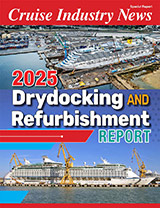The Italian Company Costa Cruises, the number one cruise line in Italy and across Europe, will tomorrow sign the new version of the voluntary “Venice Blue Flag” agreement designed to safeguard the environment and heritage of Venice. The initiative is promulgated by the local Municipality, Harbor Master’s Office and Port Authority.
Under the terms of this major environmental undertaking, Costa Cruises, along with the other signatories to the agreement, will adopt standards for all its ships calling in Venice that are actually stricter than the environmental compliance provisions currently in force. The Venice Blue Flag agreement stipulates that the sulfur content of diesel fuel used to operate ships’ engines shall not exceed 2% during transit in the Venice Lagoon, or 1.5% during stop-off at the Passenger Terminal. Signatories are also called upon to ensure that their vessels comply with all the other requirements designed to reduce emissions. The liners in the Costa fleet that will be subject to the Venice Blue Flag agreement are the flagship Costa Serena (114,500 gross tonnage and total Guest capacity of 3780) and the Costa Fortuna (102,600 gross tonnage and total Guest capacity of 3470), which will depart from Venice every week throughout the summer season in 2008 and 2009, and the Costa Victoria (75,200 gross tonnage and total Guest capacity of 2394), the third Costa ship to be deployed in Venice starting from summer 2009.
By signing the Venice emissions agreement, Costa Cruises has once again shown its commitment to safeguarding the environment in which its ships operate, and in this case the firm desire to protect the City of Venice and defend its artistic and architectural heritage.
Throughout its 60-year history the Company has always paid a great deal of attention to economic, cultural, social and environmental issues, constantly striving in pursuit of the right balance between development and conservation. This is borne out by the many achievements and widespread recognition it has attained in the environmental field.
In 2005 Costa Cruises became the first company in the world to receive the “Green Star” across the fleet from RINA (the Italian Shipping Register); this prestigious notation certifies that all Costa’s vessels comply with environmental standards for the prevention of pollution of the marine environment and it is actually stricter than the prevailing provisions of the international MARPOL Convention.
The commitment to safeguarding the environment and to corporate social responsibility in general is reflected in particular in the Company’s Sustainability Report (consultable on-line at www.costa.it), a purely voluntary form of reporting designed to provide comprehensive and transparent information on the effects of corporate activity on the environment and the community. Among the results documented in the most recent edition of the Report, concerning performance in 2006, is a 10% reduction in the volume of garbage generated per person and the introduction of a new system of disposal of waste other than food waste, with segregated streams and subsequent recycling.
Costa Cruises’ Sustainability Report has its roots in the application of the “BEST4”, an integrated management system that encompasses four types of voluntary certification of corporate compliance with the highest standards in the areas of quality (UNI EN ISO 9001, issued in 2000), environment (UNI EN ISO 14001, 2004), safety (OHSAS 18001, 1999) and social accountability (SA 8000, 2001), guaranteeing the measurement of company performance and continuous improvement. Costa obtained the BEST 4 from RINA in 2004, thus becoming the first company in the world to do so.
Further confirmation comes in the form of the partnership with WWF, the world’s largest independent conservation organization, which Costa is supporting in the efforts to safeguard three of the most precious and endangered marine ecoregions on the planet: the Mediterranean Sea, the region of the Greater Antilles, and the north-east coast of Brazil.
Elsewhere, the Swiss branch of the tour operator Kuoni has bestowed on Costa Cruises the Green Planet Award, which is the highest seal of eco-approval in the travel and tourism sector, for the exemplary ecological management and performance of its ships, aimed at minimizing their environmental impact.
Confirming its role as a major player in the field of environmental compliance, Costa has also entered an agreement with CIAL – the National Consortium for the Recovery and Recycling of Aluminum – for the separate disposal and recycling of aluminum packaging on board its liners, a first for Italian shipping. Meanwhile, in 2005 Costa Cruises launched a project of collaboration with the Joint Research Centre of the European Commission for monitoring climate change in the Mediterranean.
Most recently, on April 22 this year Costa Cruises participated in “International Earth Day”, through the promotion SEED (Steiner Evergreen Earth Drive) launched by Steiner Leisure, Costa’s partner in the management of its shipboard spas. For every Guest who experienced a treatment at one of the wellness centers on board the 12 Costa liners, Steiner Leisure planted a tree (donation of $1) in support of the “Arbor Day Foundation”, which is the world’s largest tree-planting organization.
Costa Cruises’ environmental commitment actually goes beyond its ships. April 17 this year marked the official commencement of the innovative “Palazzo Costa” project, an architectural plan to extend and redevelop the Company’s headquarters in Genoa. The new offices, which will change the landscape of one of the city’s best known piazzas, will be a perfect blend of creativity, innovation and respect for the environment, with certain features that will be at the cutting edge of Italian architecture. For example it will be one of the country’s first buildings with “zero C02 emissions on site”.



